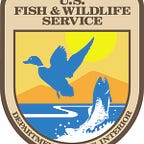You Otter Know: The Difference Between Sea and River Otters
By: Deanna Lynch, USFWS biologist in the Washington Fish and Wildlife Office
As a biologist with the U.S. Fish and Wildlife Service in Lacey, Washington, I answer all kinds of wildlife-related questions. Every spring and summer, I receive numerous phone calls and emails from throughout the Puget Sound area requesting that I come get a sea otter out from under a house, off a boat, or off a deck. Usually this critter is making a very large mess and it stinks.
My general response is to ask a few basic questions, then explain that this critter is really a river otter, not a sea otter, and they will need to inquire with their local animal services to get assistance with encouraging the river otter to relocate.
Just because they are called river otters, doesn’t mean they only occur in a river or fresh water. All along the West Coast, rivers otters can be found swimming and foraging in the near-shores of the Pacific Ocean, including the Puget Sound. In Washington, sea otters primarily live on the outer coast between Makah Bay and Grays Harbor, but we get occasional sightings in the Puget Sound.
Have you caught a glimpse of one of these critters? Here are some easy ways that you can tell the difference between sea otters and river otters:
Are you a more knowledgeable otter spotter now? Take a “pup quiz” (see what we did there?)! Test yourself on these otter photos below and check out our otter page here if you’re stumped.
Answers: These three are all sea otters (credit: Deanna Lynch/USFWS) while the first and last photos in this blog are river otters (credit: Barry Troutman). If you find these critters as otterly fascinating as we do, check out these additional resources to learn more:
- 12 Facts About Sea Otters for Sea Otter Awareness Week: https://www.doi.gov/blog/12-facts-about-otters-sea-otter-awareness-week
- River Otter Profile: https://www.nps.gov/yell/learn/nature/river-otter.htm
- Sea Otter Profile: https://www.fws.gov/alaska/pages/marine-mammals/sea-otters
